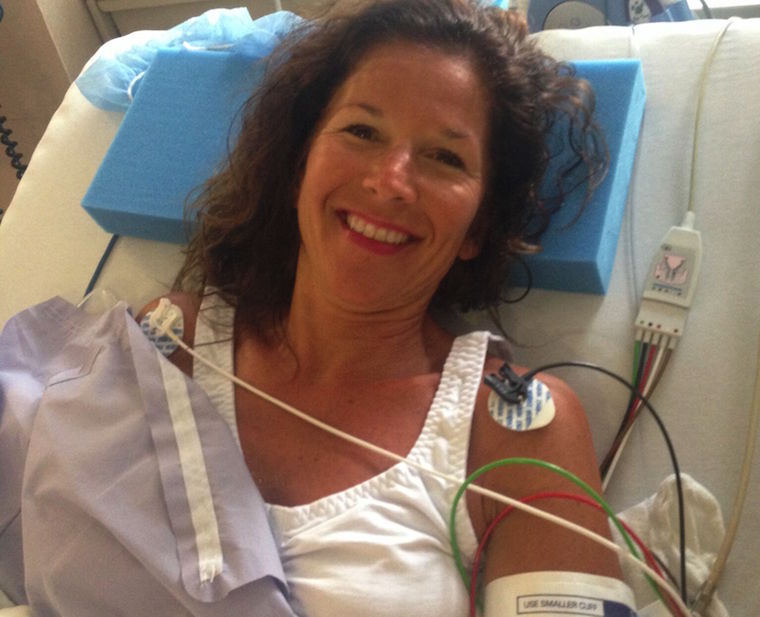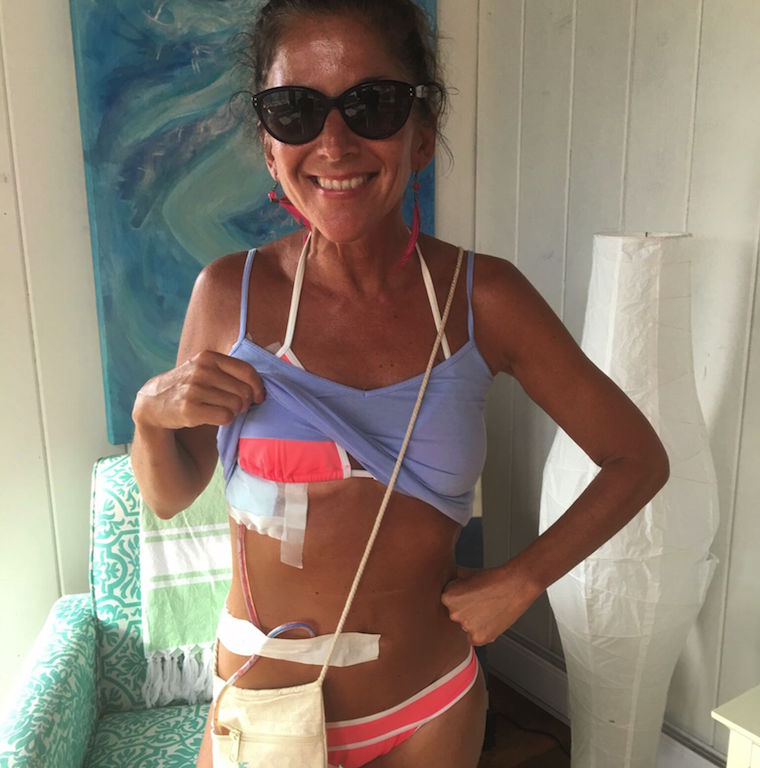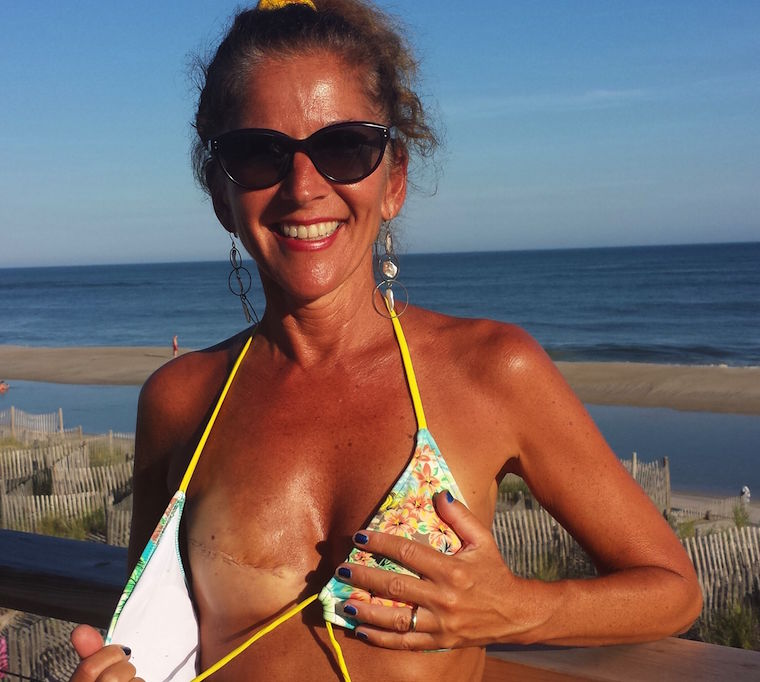Yes, Even the Healthiest Women Get Breast Cancer
She does not look like someone who will be starting chemotherapy the next day—but she will be. The day after that, she plans to be back at the studio training her regular clients. “Maybe I can’t do my workout, but nobody says I can’t sit there and say, ‘Ten more—let’s go!’” she reasons.
Trifunovich, 51, was one of Uplift’s original trainers and is the creator of its “Fit and Fierce after 50" program. She was diagnosed with breast cancer in July, had a mastectomy in August, and will be getting a mild form of chemo for the next six months.
There are plenty of research-backed lifestyle factors that can help modify risk, but nothing's guaranteed—even for those who dedicate their lives to wellness.
She uses the word “lucky” constantly to describe her experience with the disease so far, in terms of the treatable characteristics of her particular cancer and especially the resources and support she’s had. That’s one reason Uplift is donating proceeds from its October “We Fight Sweaty Challenge” to the Breast Treatment Task Force, an organization that helps low-income women access screening and treatment.

{{post.sponsorText}}
She's lucky, yes, but her story also points to the unsparing, unpredictable nature of breast cancer. Maybe you have a BRCA gene mutation and never get it; maybe you exercise and eat broccoli every day and do. There are plenty of research-backed lifestyle factors that can help modify risk, but nothing's guaranteed—even for those who dedicate their lives to wellness.
I sat down with Trifunovich and asked her to share her story (which is edited and condensed), in case it may inspire others who are faced with a similar challenge.

On diagnosis
When I was 27 years old, my mother died of inflammatory breast cancer, which is a very, very rare form of breast cancer. It’s really aggressive, and she died within a year, so I had this horrible experience. I was pregnant at the same time. I gave birth to my son just a couple of days before she died. It was really a very emotionally loaded time in my life. Then, only a year after she died, I found a lump in my breast. I had a one-year-old baby. I was terrified. But it was benign, it was something called a fibroadenoma. Then I had another one of those in my late 30s. Some women are just prone to them.
So, when I was in my 40s, you would think based on all of these things that I would be diligent about getting breast screenings. This is a part of my story that’s really hard to say, but I was not diligent enough. I didn’t go every year. I had my last mammogram probably about five years ago, which is bad. I was lucky because this spring I felt something, a lump in my right breast.
I knew that if it was negative, they would have been dancing, doing the samba...but they weren’t, they were just strolling with the doctor smiles.
When that lump didn’t go away I reached out to one of my girlfriends, who is a doctor and one of my best friends. She came over, gave me a breast exam, and said, "I don’t know what it is. It feels like another fibroadenoma, you’ve already had one, you might have another one, but you have to go get a mammogram...like, right now." She got my phone and made the appointment right then and there. I went for the mammogram and, from that moment on, everything just started to roll. They saw something that looked suspicious and that didn’t look consistent with a fibroadenoma, and they said I had to have a biopsy.
My friend looped in another friend of ours, who’s a gynecologist in New York. So I had these two doctor friends advocating for me. They were able to get my biopsy results back in two days, which is unheard of, but they understood the torture of waiting, the unknown. It is so horrible. We were all at the beach together that Friday. I was sitting on my blanket, my husband was there, and I saw the two of them coming over. They had their arms linked, and they were smiling what I call their "doctor smiles." Like, "Everything’s going to be okay!" And I knew that if it was negative, they would have been dancing, doing the samba...but they weren’t, they were just strolling with the doctor smiles. They told me right then and there on the beach, and we were all hugging.

On treatment
I went to see the surgeon, and I was a nervous wreck, but I had my husband and my son. They were very strong and focused and asking questions, and I was jumping out of my skin. My blood pressure was through the roof; my heart was pounding. I couldn’t sit still. I was doing downward dog and walk-out planks and stretching out in the room waiting for her because I was so scared.
She examined me and looked at the slides from the MRI and the mammography, as well as the pathology reports, and at that point told me I had a choice: I could have a lumpectomy or I could have a mastectomy. Part of me was intrigued by the lumpectomy. And then she said, "But in the MRI there was another area that looked suspicious, so if you wanted to have a lumpectomy we’d have to do another biopsy." So I went home and thought about it and talked to my girlfriends about it...and I decided just to go for the more aggressive choice and have the mastectomy.
A week after my surgery, I was at the beach, with my surgical drain.
I had to wait until August 11—which I know is not such a long time, some women have to wait for months and months, but it felt like a long time—for my surgery. After, they gave me the tubes and surgical drains. A week after my surgery, I was at the beach, with my surgical drain. I have this cute little bag that you put across your shoulder to put your phone in. Well, I put the surgical drain in there, and I had everything else taped, and I put on a tank top, and I sat on the beach under an umbrella. So I was able to be on the beach and surrounded by my friends, the sunshine, and all the love and support from my community.

On health issues happening to healthy people
Initially, I was very surprised. Me? This is happening to me? I’ve just always, always been active, and I’ve always really believed in the mind-body connection. I never get sick. I honestly can’t even remember the last time I had a cold. My husband kept saying, "Maybe it’s a mistake. Maybe they mixed up your pathology." But there’s a part of me, an unconscious part of me, that I think has always been expecting this because of my mother. And that’s that same unconscious devil that put me into such denial that I didn’t go get the mammogram every year.
I never get sick. I honestly can’t even remember the last time I had a cold.
As far as the fitness part of me, that can only benefit me going forward, and I bounced back from surgery miraculously. Everybody was like, "Oh my God Vera, you’re healing so well!" Scars, energy levels, everything. And I’m 100 percent sure that’s because I’ve been fit my whole life.
I fully intend to work out during chemo, and I have an appointment with a nutritionist that specializes in creating programs for people who have cancer or are undergoing chemotherapy. I’m really excited about that, so I can create a nice healthy diet for myself and try to balance out some of the toxic effects of chemo.
Her advice
The first piece of advice is just don’t be afraid to get the mammogram. Don’t make my mistake. Go—even if you’re scared shitless, just do it. The other piece of advice is that if you are diagnosed with breast cancer, it’s no longer a death sentence. Don’t live in fear. Of course you’re going to be afraid, that’s natural, but open yourself up to love, support, and information, because there are so many treatments, there are so many women who have breast cancer and are doing really, really well. That’s one thing I discovered as soon as I started talking about it. Reach out to other women who have had it.
Smart resources for Breast Cancer Awareness Month: Understand your risk, practice breast self-awareness all year long, and make sure to ask your doctor these questions about breast health.
Loading More Posts...